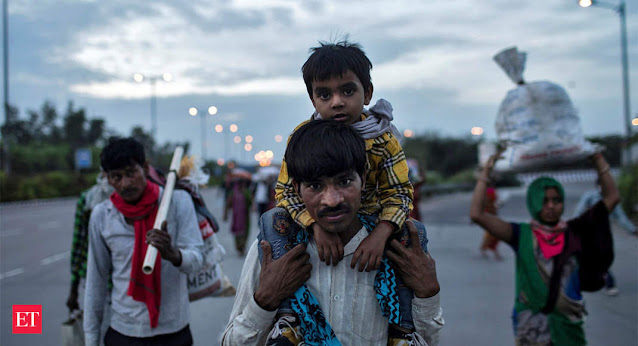May 2020, Coronavirus First Wave.
Beyond the four walls of privilege, is the real world that Coronavirus has really broken.
Young men carry frayed knapsacks and walk around in circles. The city-of-dreams’ belongings on their backs, the nightmare of a weight of something heavier on their shoulders. Aimless. Directionless. Eyes glazed not by cheap booze but by something cheaper. Hunger. Home is too far to walk. Or isn’t it? Is it? Or isn’t it?
A migrant dead on his cycle many hundred kilometres away from his house, would tell you it is. Those mowed down by a train in their sleep would also agree. But if you could revive either, chances are, they’d try for home again. What would be insanity in a sane world, now seems the only rational course of action.
‘Home is the place where, when you have to go there, they have to take you in’, Robert Frost said evocatively many moons ago. Warm words, cold comfort.
Others lie on the pavement, too tired to even get up. Human flies swatted away by the heavy hand of uncaring, ineffective or insufficient governance. Too exhausted by the enormity of just surviving the everyday. Their amygdalas taking over, conserving the last vestiges of energy for survival, saving nothing for dignity.
Tired, frail, bewildered Sisyphus pushing up a down escalator.
An old man refuses a hundred rupee note. Asks instead for bread and jam. He might have had the eyes of a madman, only if they weren’t clouded over by cataract. If only I could meet them.
And what of the little ones? The tykes we’re used to seeing at traffic signals are energetic, purposeful and childlike happy as compared to these kids. These waifs have their hands thrust out at you not with a demanding rat-a-tat but with a quiet, desperate silence. While their parents stare on from nearby, believing in advertising’s eternal gospel that children evoke deeper emotions.
No beggar mafia this. Just 7-year-olds fending for their parents. Let that sink in.
Another elderly homeless woman who I’ve befriended these last three years, sits like it is yesterday from a different life. Only now, some kind soul has given her a mask. I tell her about a camp a few hundred feet away, and she gestures to her swollen knees. I check on her as often as I can, but how often is as often?
Indeed, how much is too much?
If the point of privilege is giving it away, then no amount of giving seems enough. Loaves of bread disappear in seconds. More disappear even faster. Donating to one small charity reminds you that there are more. Many, many more. And that usually warm glow of doing something good – now that’s just a burn reminding you that you’re so much better off.
And now, see this from their eyes. A class of people divided by many things, is now divided by a line itself. Those who can queue up vs those who cannot. A serpentine column of people carrying more in their wallets than those outside it will earn in their lifetimes. A human train of chance and opportunity, of a lucky birth to the right parents. Standing restlessly behind their masks. Bored on their phones. Worried that they might end up having to pick up spaghetti over fettuccine, if stores run out. Too self-indulgent for empathy, yet not too unaware to avert their eyes from those asking a question.
And now, see this from the eyes that ask you. Imagine looking at a supermarket filled up with more than a belly can hold, and people bursting forth with bags heavier than they can carry.
So my friends, you see, it’s not depressing to not be able to step out. It is not depressing to not be able to meet friends, buy booze or go to that vacation from last year.
Privilege means these are all only minor, trivial, inconsequential inconveniences.
If you want to see something heart-squeezingly, gut-emptyingly depressing, do this. Break no laws, wear a mask and go out on an essential errand.
It is essential that you open your eyes.
ram cobain
(Image courtesy Economic Times)

No comments:
Post a Comment